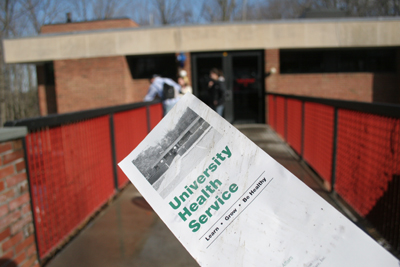
Following recent activity on campus, student health has become a prominent issue among the faculty and student body of Binghamton University. Resolutions passed in the Student Association, the formation of student groups encouraging sexual health awareness, the increasing availability of vaccines at the health center and fund raising taking place for a student battling meningitis, have all increased awareness on campus.
The SA has recently passed a resolution that will have its Research and Planning Committee look into whether or not it is possible for the University to provide free STD testing on campus.
‘They’ll be looking into the cost and whether or not it’s a feasible option,’ said sophomore history major and College-in-the-Woods representative Jessica Poretsky, who authored the resolution. ‘Considering that we’re on a college campus, I just felt that these services should be available.’
The recently chartered student group APAC (AIDS Prevention Awareness and Care) is also trying to increase the volume of information available on HIV testing on campus.
‘There is no cure, but the disease is absolutely preventable,’ said APAC president Adam Kahan, a senior philosophy and French major. ‘It’s been shown that testing initiatives drastically reduce infection rates.’
Citing statistics indicating a poor comprehension of the disease on campus from the survey conducted by the HDEV 480C class last semester ‘ previously reported by Pipe Dream ‘ Kahan described the information available on campus as ‘pretty pitiful.’
‘Seventy-five percent of Binghamton students are sexually active,’ he said. ‘They’re already at risk.’
The Health Center does, however, currently offer a full range of STD screenings to students and, according to the administrative director of Health Services, Johann Fiore-Conte, these services are taken advantage of by students.
‘Our practitioners will order any kind of testing requested. The exam is provided free of charge, but any kind of testing that requires samples to leave here is billed to the students,’ she said. ‘Students do come here with concerns about STDs, as they should. We want them to do that.’
In light of growing awareness nationwide, Health Services has begun carrying the human papillomavirus (HPV) vaccine. According to the New York State Department of Health, 99.7 percent of cervical cancers are caused by HPV infection.
The vaccine has recently garnered nationwide attention as the governor of Texas announced that all school-age girls will be inoculated against the virus, causing an uproar among conservative Christian families. While inoculation in New York is still voluntary, it is recommended that all females between the ages of 9 and 26 receive the vaccine, as it protects against the strains that cause 70 percent of HPV infections.
Since the vaccine became available, however, only four students have gone to the health center to receive then vaccine.
According to Fiore-Conte, it may have something to do with the high cost of the vaccine.
‘It’s a series of three, $140 per dose,’ she said, ‘$420 if students were to get all three.’
Also garnering attention on campus is BU student Mayra Rodriguez’s case of bacterial meningitis. The junior fell ill while studying abroad in Spain this semester and many students are raising money to aid in her recovery.
While meningitis is not necessarily new to BU ‘ two students were hospitalized with the illness during the Fall 2003 semester ‘ campus has become busy with activity in attempts to raise awareness about the disease and Rodriguez’s plight.
While she had been vaccinated twice against bacterial meningitis, the vaccination is only 85 to 100 percent effective at protecting against four types of the disease that cause 70 percent of the cases. It is possible that Rodriguez caught one of those four types, or caught a type not protected against by the vaccine.
Currently, the University does not require students to receive the vaccine.
‘The decision is based on New York State Public Health law that says that students need to be educated on meningitis and the meningitis vaccine,’ Fiore-Conte said. ‘It is not a requirement to receive the vaccine, but documentation that students are aware is required.’


